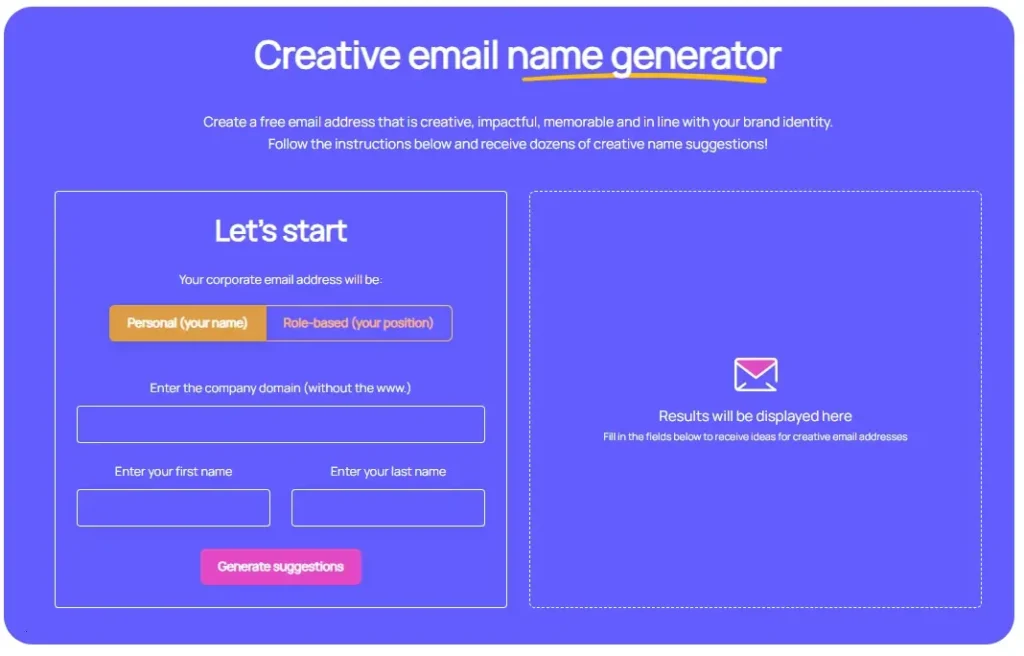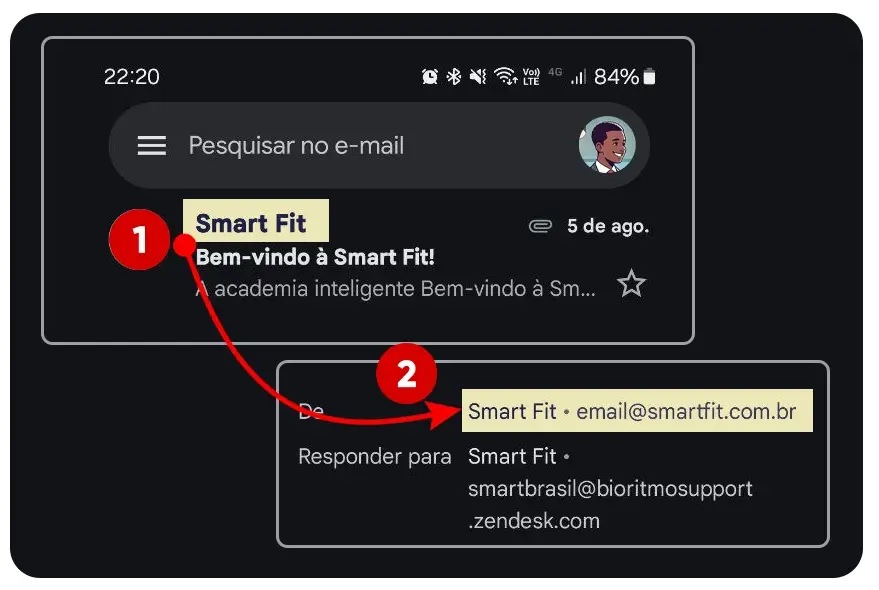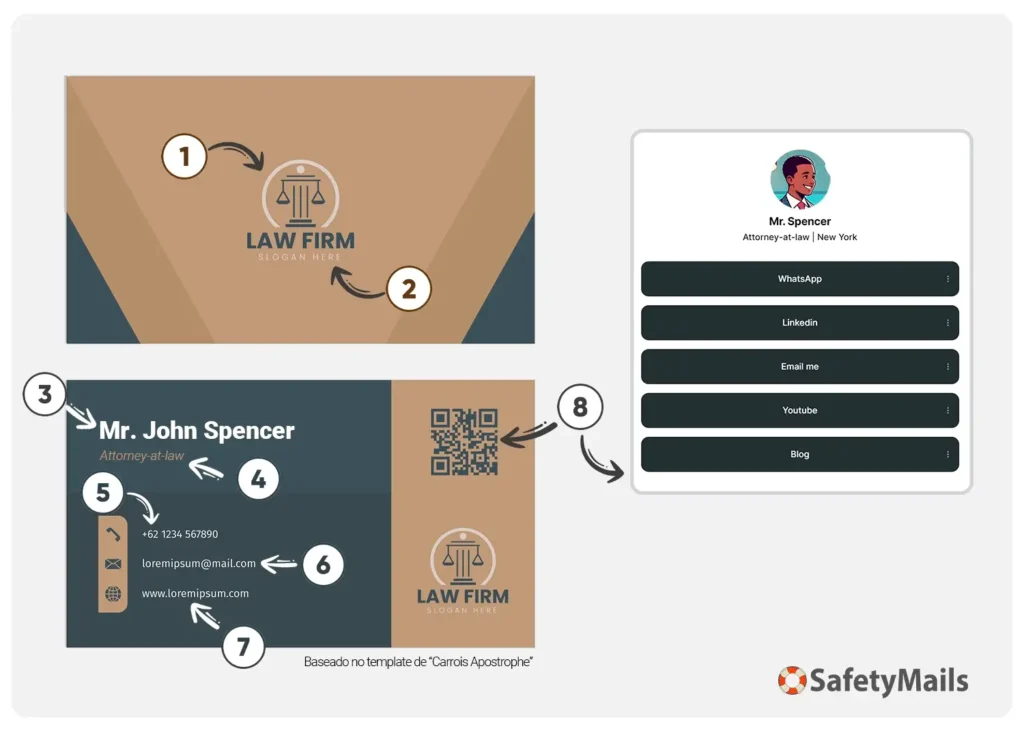A lawyer email address is essential for maintaining an effective relationship with clients and conveying an image of professionalism and trust.
The effectiveness of this communication channel depends directly on the professional’s ability to adapt its use to day-to-day needs and always apply best practices, whether in the way they write or in the tone used according to each audience they are dealing with, which can be more formal or simpler. And both will be necessary.
Using the guidelines below wisely can turn a simple communication channel into a powerful tool for relationships, branding and new opportunities.

Table of contents
Practical uses for lawyer email that make work more professional
More than just a communication tool, a lawyer’s email address acts as a kind of “letterhead” for the professional or their law firm. In other words, a professional email address (rather than a generic @gmail.com) sets the tone of professionalism that the practice of law demands.
Lawyer email name
When creating a lawyer’s email address, define its purpose: is it for the firm or for a specific professional? In both cases, communication must be consistent, taking into account the essential elements of an email address:
Personalized domain
The first step is to get a personalized email domain. No @gmail.com or the like! Leave these domains for personal use.
In the professional sphere, it’s your brand that should prevail. So get your own domain.
Easy to remember
When using names, both for the owners of the email and for the domains to be created, remember that they need to be easy to remember, after all, lawyers need referrals to have more clients and success. This won’t be possible if your client can’t remember your name and email, don’t you agree?
Lawyer email name generator
Do you want to create your own email name but you’re out of ideas? How about using SafetyMails’ Creative Email Name Generator? It’s free and offers thousands of options! You can search for personal or company email ideas in just three clicks.

The Email Name Generator is available in English, Portuguese, Spanish, German, French and Italian. Take advantage and access it now on the SafetyMails website!
Label & Branding
The email inbox is a compact space where information is not always seen or read in its entirety. That’s why you need to make it obvious and memorable.
One way of doing this is by using labels in the sender’s email addresses.
For example, instead of receiving an email from “[email protected]”, you would just see “Ms. Spencer” in the sender field. You can do this simply by typing in the sender’s name and putting the email address between the <> signs – Ms. Spencer <[email protected]>.
This makes better use of the reduced inbox space and strengthens your brand.

In the image above:
- The sender name displayed is “Smart Fit”
- The real email behind this name (label) is “[email protected]”. To get this result, the email was sent with the sender field filled in as: Smart Fit <[email protected]>
Lawyer email signature
A professional email is not complete without a proper signature, with contact information, office logo and links to professional profiles (such as LinkedIn), alternative means of contact (such as WhatsApp), and calls to informative channels (such as the Blog or Youtube).
For more details, we recommend reading our blogpost on email signatures.

Practical uses for lawyer email that make work faster and more secure
Email is an effective communication channel that allows lawyers to communicate with their clients quickly and efficiently, whether it’s sending case updates, important documents or answering questions and queries in an agile manner.
Secure data sharing
Obviously, sharing documents should be done in accordance with the best data protection practices, avoiding leaks.
One way of doing this is through secure repositories with exclusive access, such as Google Drive or Dropbox, for example. With these, you can share an access link to a specific folder or document and only the registered recipient will be able to access the content.
Of course, there are other ways of securely sharing data and documents, but we won’t go into them at the moment.
Scheduling of meetings
One of the most popular uses of email is to send invitations (called “invites”) to meetings. The lawyer’s own email software (such as Microsoft Outlook) or webmail (such as Google Workspace) sends a meeting invitation to one or more recipients.
Upon acceptance, the meeting is automatically registered in the recipients’ online agenda, with a link to remote access (such as Google Meet, Teams, among others).
Automatic replies
A general feature of email, but one that has a very useful application in the case of lawyer emails, is the reply automation feature.
Professionals can register some email reply templates which, depending on the subject or even the sender, can send an automatic and immediate reply to inform their clients of the confirmation of receipt of an email, the deadline for a reply, among others, keeping the flow of communication permanent and effective.
Remember: customers appreciate a quick response, even if it’s just to confirm receipt of messages and promise a more detailed response soon. This helps to keep the customer informed and shows that you are attentive to the case.
Message management
Managing a lawyer’s email communication process involves not only writing good messages, but also establishing practices that optimize time and productivity.
Just as in the material world, where there are folders and files, managing email messages makes access to information much faster and more efficient. A disorganized inbox can lead to forgetfulness and delays in responding.
Creating folders to organize your work
Your email or webmail program allows you to create folders and even automatically direct incoming messages to each of these folders.
Some ways to organize your email folders can be:
- By client
- By case
- By professional
For lawyers who deal with many clients, automating follow-ups can be an efficient solution. Tools such as CRM (Customer Relationship Management) allow you to schedule automatic reminders, ensuring that no client or important event is forgotten.
What is important to consider in a lawyer’s email address
From creating an attractive subject line to crafting a personalized message, every detail contributes to effective communication. The result is the creation of a lasting relationship.
Brand identity
Brand consistency is a very important factor in all of a law firm’s material. In the case of lawyer emails, this is no different.
The attention given to visual identity counts as a factor of the firm’s professionalism and refinement, including the color scheme, the use of the logo, typography and standardized signatures.
Visual consistency helps to fix the brand in the client’s mind, creating a positive and trustworthy association.
Follow a clean layout pattern in the email: this gives the impression that the lawyer is organized, attentive and committed to quality.
On the other hand, a disorganized email or one without standardized visual elements can give the impression of carelessness, which can negatively affect the lawyer’s image.
Personalization and appropriate tone
Personalizing the lawyer email with the recipient’s name and, where possible, inserting references to previous interactions can increase the connection with the recipient.
In addition, the tone of the email should reflect professionalism, but also be approachable and friendly.
A lawyer’s email should be structured logically and clearly. Start with a respectful greeting, followed by an introduction that puts the recipient in context about the reason for the contact.
The main message should be direct and well organized, using short paragraphs and bullet points to make it easier to read. Don’t overwhelm the reader with unnecessary information; instead, focus on the main points that need to be communicated.
If you are not talking to your peers (other lawyers), avoid complex legal jargon that could confuse the client, unless it is absolutely necessary. The language should be adapted to the profile of the recipient, ensuring that the message is understood and appreciated.

Proofreading: an error-free email is key
Before sending the email, it is essential to proofread it carefully. Grammatical or typing errors can affect the lawyer’s credibility and also cause a negative perception in the client.
Use proofreading tools and, if possible, ask someone else to proofread the message. An error-free email conveys attention to detail and reinforces the image of professionalism.
There is even automatic proofreading software that can be connected to email software, helping the proofreading process, avoiding errors and even suggesting synonyms to avoid redundancies, among other features.
We can’t forget the power of artificial intelligence either. There are a number of AI services that can help create, revise and optimize texts quickly and efficiently, all the professional has to do is ensure that all the content is appropriate and coherent.
Be very careful with advertising
In some countries, such as Brazil, there is a ban on advertising legal services, as provided for in their code of ethics. This ban is not exclusive to Brazil, but varies widely according to the country and its respective ethical and legal regulations.
Not everything is allowed
Before creating any material or thinking about any promotional action, it’s very important to find out whether it fully complies with the guidelines and legislation of the country in question.
Let’s look at some examples:
Brazil
In Brazil, the Code of Ethics and Discipline of the Brazilian Bar Association (OAB) prohibits overt advertising of legal services. Lawyers can advertise their services discreetly and informatively, without resorting to marketing practices that could be considered commercialism or that disrespect professional decorum.
India
In some countries, such as India, the advertising of legal services is largely restricted, similar to what happens in Brazil.
China
In China, advertising is permitted but heavily regulated, with many restrictions in terms of content and method of dissemination.
Below are some of the countries that are friendlier towards advertising legal services:
United States
In the United States, advertising for lawyers is permitted but regulated. The American Bar Association (ABA) imposes certain restrictions to ensure that advertising is not misleading or false. Since the landmark decision in “Bates v. State Bar of Arizona” in 1977, lawyers have had the right to advertise as long as they comply with established ethical rules.
United Kingdom
In the UK, advertising for legal services is permitted. Lawyers can promote their services widely, including through advertisements, as long as they are not misleading and respect the ethical standards set by the Solicitors Regulation Authority (SRA).
European Union
Legislation on advertising for lawyers varies between EU countries. In general, there is a tendency to allow advertising, as long as it is done in a dignified and informative manner. Specific regulations may vary, but the practice of advertising is less restrictive than in Brazil.
Canada
In Canada, advertising for lawyers is also allowed, with restrictions. The rules vary by province, but in general lawyers can advertise as long as they are truthful and do not mislead the public.
Australia
In Australia, advertising for lawyers is regulated but permitted. The rules vary between states and territories, but, as in other countries, advertising must be truthful and not misleading.
How not to make a mistake
As you can see, some countries are stricter in their regulations, while others may seem excessively permissive. Therefore, if you want to avoid mistakes, the first step is to become thoroughly familiar with the regulations in the place where you intend to practice law.
However, in general terms, there are some ways to promote your service and law firm without violating regulations and codes of ethics.
Sending newsletters
Sending emails sharing legal articles and opinions published in blogs, specialized magazines or newspapers, where lawyers share knowledge without directly promoting their services.
There is also space here for notices about updated legislation, reminders of legal calendars, sharing links to the recording of the latest online lecture, among others.
Request for feedback
Asking customers for feedback on the service provided via email is a way of demonstrating commitment to the quality of service, which can indirectly be a form of branding.
Invitations to events or lectures
Sending emails inviting lawyers to take part in events, lectures and seminars where they use these spaces to introduce themselves and publicize their area of practice, as long as there is no direct commercial promotion. In other words, speaking on a particular topic is an excellent way of building a reputation and being sought out by potential new clients in the future, in a passive way.
Use of social networks
Many legal professionals use social media to share shorter content about their opinion or interpretation of the law. Others also use YouTube channels for longer videos, where they comment on cases, go into greater depth or offer online lectures on important topics, such as Data Protection Laws.
As long as they are not offering services, there are no problems.
Business cards: vintage, but still very useful
You can say it’s old. You could even say it’s old-fashioned. But the fact is that business cards are very practical when a professional is approached and needs to give their contact information. A card that includes the lawyer’s name, office, specialty, and contact information, in a discreet and informative way, is permissible and, frankly, very useful.
See the example below:

A proper business card contains the following elements:
- Your office logo.
- Beware of using slogans. They may be banned in some countries. Give preference to designating the specialty.
- The name of the professional.
- Designation of specialty or position in the office.
- Contact telephone number (which can also be WhatsApp).
- Professional email address.
- Office website.
- QRCode pointing to a tree of links, with YouTube channel, email address, social networks, whatsapp for clients, automatic scheduling of meetings, etc.
Conclusion
A lawyer’s email can be used strategically to consolidate an image of professionalism and efficiency, both in client relations and in the firm’s internal management.
By adopting appropriate practices, such as choosing their own domain, creating a visually attractive and useful signature, and using tools that guarantee the security and organization of messages, lawyers not only improve communication, but also strengthen their personal or institutional brand.
What’s more, professionals who pay attention to ethical advertising regulations avoid penalties and keep their reputation intact. The key is to balance innovation with respect for the rules. In this way, lawyers can turn email into a powerful working tool.

FAQ
Can a lawyer use a generic email address, such as @gmail.com, to communicate with clients?
Yes, but it is not recommended that lawyers use generic email addresses, as these domains do not convey the same level of professionalism as a proper, corporate domain, which reinforces the firm’s identity and contributes to building a solid brand, as well as providing greater confidence to clients.
How important is an email signature for lawyers?
A well-designed email signature conveys an image of professionalism and organization. It should include basic contact information, such as telephone number, email address, and links to professional profiles or the firm’s website, as well as the logo.
Is it allowed to advertise legal services?
In some countries, such as Brazil, advertising legal services is highly restricted. In practice, lawyers can advertise their services in a discreet and informative way, avoiding practices that could be seen as mercantilist or that disrespect professional decorum. Other countries may be more permissive when it comes to advertising legal services.
Is it possible for a lawyer to use social media to promote their work without violating regulations and codes of ethics?
Yes, lawyers can use social media to share informative content, such as articles, legal analysis and opinions on legislation, as long as they are not directly promoting their legal services. Creating content demonstrates knowledge and expertise in certain areas of law and is an effective form of branding that does not violate any restrictions, as long as there are no offers of services or explicit advertising.



